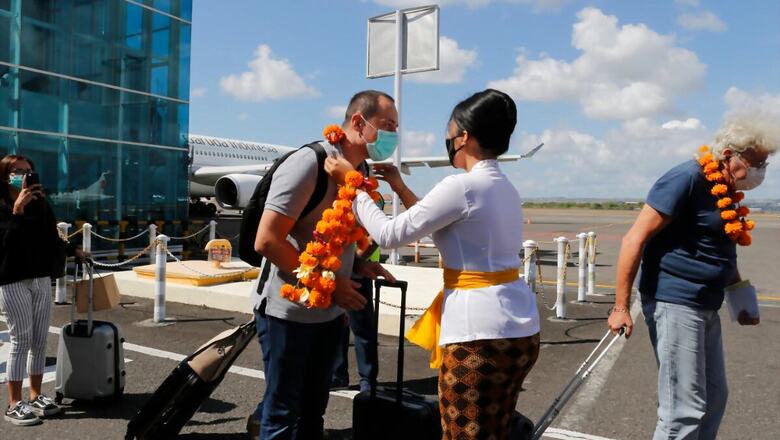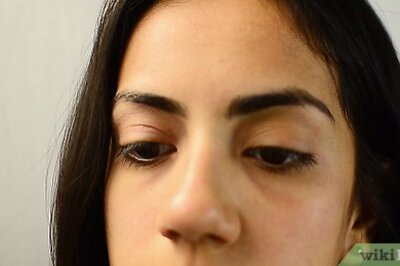
views
India added another record surge in virus cases Friday as the government decided to lift a nighttime curfew that was in force since March.
The 55,079 new cases in the past 24 hours took India’s total to 1,638,871. The Health Ministry on Friday also reported 779 deaths in the past 24 hours, taking fatalities to 35,747.
The actual numbers, like elsewhere in the world, are thought to be far higher due to a number of reasons including limited testing.
The nighttime curfew will be lifted from Saturday and yoga institutes and gyms can reopen Wednesday, according to the Home Ministry. The government also removed interstate restrictions on movement of people or goods.
The government also decided to reopen hotels in the Indian capital, which had been used as quarantine facilities. After peaking at nearly 3,500 new cases a day earlier this month, New Delhi's numbers have dropped to around 1,000 cases a day.
After the nationwide lockdown was largely lifted, lockdowns now remain only in areas that are hot spots of infection and are decided by state and territory governments.
Metro services, cinemas, swimming pools, entertainment parks, bars, theaters, auditoriums and other social gathering places will remain closed until Aug. 31, the Home Ministry said.
In other developments in the Asia-Pacific region:
— Indonesia’s resort island of Bali reopened to domestic tourists Friday after an almost four-month lockdown. Visitors will face stringent rules in hotels, restaurants and on beaches. New foreign arrivals will be allowed on the island beginning Sept. 11. Tourism is the main source of income for the island, but the pandemic has caused a dive in the number of visitors.
— Vietnam’s health ministry reported a daily high of 45 more cases Friday, all of them connected to a Da Nang hospital where the first case surfaced last week. All of the infected are hospital staff, current or former patients and their family members. The outbreak was Vietnam’s first in more than three months, and it reacted quickly since Da Nang is a popular beach destination and thousands of tourists were vacationing on its golden beaches. The city was put under lockdown on Tuesday and testing and business restrictions increased in other areas. Da Nang was setting up a makeshift hospital in a sport auditorium, and doctors have been mobilized from other cities to help.
— Philippine President Rodrigo Duterte further relaxed quarantine restrictions and will shift the virus response to localized lockdowns where infections surge. Central Cebu city had been the last major area under a lockdown, but Duterte said it would move to general quarantine status from Saturday to Aug. 15. The Department of Health reported its highest daily tally of new and old COVID-19 cases on Thursday at 3,954, bringing total infections to 89,374, including nearly 2,000 deaths. Despite such spikes, the government has been under pressure to open the economy more widely.
— Nepal is opening its Himalayan peaks, hoping to bring back Western climbers unable to come during the spring mountaineering season. Both the government and expedition workers and businesses are hoping foreign climbers who bring some $300 million annually to Nepal will return during the autumn climbing season that begins in September. Nepal is opening to commercial flights from August. Rudra Singh Tamang, director general of Nepal’s tourism department, said mandatory test reports and quarantines when needed are among the measures being used to ensure tourism returns safely.
— Victoria state’s leader warned that tougher pandemic restrictions could be looming after Australia’s coronavirus hot spot reported its second-highest daily COVID-19 count. State capital Melbourne and a neighboring semi-rural district are over halfway through a six-week lockdown. Victoria Premier Daniel Andrews said the lockdown was being analyzed to determine the next steps “but it is important that all of us acknowledge that these numbers are still far too high.” Victoria on Friday reported 627 new infections and eight deaths.
— China is tightening travel restrictions in the capital of Xinjiang, where 112 new cases were reported Friday. People arriving in Urumqi from high-risk places must undergo a two-week quarantine. Others most show proof of good health. Locals should stay in the city or show proof of health to be allowed to leave. Almost all regions in China are designated low and medium risk, except for the northeastern port city of Dalian, which is high risk due to an ongoing but smaller outbreak. Hong Kong had almost 150 new cases reported Friday. It is allowing restaurants to operate under limited hours and capacity, while bars and amusement parks are closed and public gatherings are restricted to two people.
— South Korea's 36 newest cases were mostly tied to international arrivals. The figures announced by South Korea’s Centers for Disease Control and Prevention brought the national caseload to 14,305, including 301 deaths. The KCDC said 22 of the new cases were linked to people arriving from abroad. The country in recent weeks reported dozens of infections among South Korean construction workers airlifted from virus-ravaged Iraq and crew members of Russia-flagged cargo ships docked in South Korean ports.

















Comments
0 comment